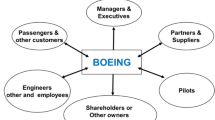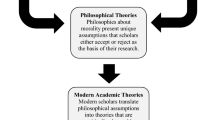Abstract
This paper applies theory and research examining errors in complex organizational systems to the problem of individual and collective morality in organizations. It is proposed that because of the nature of complex organizations, unjust outcomes can (and will) result from organizational actions even when all organization members have acted responsibly. The argument that complex organizations are therefore immoral is considered and rejected. Instead, the paper argues that morality in complex organizations begins with "heedful interrelating" among individual organization members. The paper concludes with a discussion of organizational processes and structures that promote heedful interrelating.
Similar content being viewed by others
References
Arendt, H.: 1964, Eichmann in Jerusalem (Viking, New York).
Boisjoly, R. P., E. F. Curtis and E. Mellican: 1989, 'Roger Boisjoly and the Challenger Disaster: The Ethical Dimensions', Journal of Business Ethics 8, 217-230.
Donaldson, T.: 1982, Corporations and Morality (Prentice-Hall, Englewood Cliffs, NJ).
Emery, F. E. and E. L. Trist: 1946, 'Socio-technical systems', in C. W. Churchman and M. Verhulst (eds.), Management Science, Models, and Techniques, vol. 2. (Pergamon).
French, P. A.: 1979, 'The Corporation as a Moral Person', American Philosophical Quarterly 16, 207-215.
Friedman, M.: 1962, Capitalism and Freedom (University of Chicago Press, Chicago, IL).
Goodpaster, K. E. and J. B. Matthews, Jr.: 1982, 'Can a Corporation Have a Conscience?', Harvard Business Review 60, 132-141.
Kant, I.: 1981 (1785), Grounding for the Metaphysics of Morals, translated by James W. Ellington (Hackett Publishing Company, Indianapolis).
Keeley, M.: 1981, 'Organizations as Non-Persons', Journal of Value Inquiry 15, 149-155.
Langer, E. J.: 1989, 'Minding Matters: The Consequences of Mindlessness-Mindfulness', in L. Berkowitz (ed.), Advances in Experimental Social Psychology, Vol. 22 (Academic Press, San Diego), pp. 137-173.
Mill, J. S.: 1962 (1861), Utilitarianism (William Collins Sons & Co., Ltd., London).
Ozar, D. T.: 1979, 'The Moral Responsibility of Corporations', in T. Donaldson and P. Werhane (eds.), Ethical Issues in Business: A Philosophical Approach (Prentice-Hall, Englewood Cliffs, NJ).
Perrow, C.: 1984, Normal Accidents: Living with High-Risk Technologies (Basic Books, Inc., New York, NY).
Phillips, M. J.: 1995, 'Corporate Moral Responsibility: When it Might Matter', Business Ethics Quarterly 5(3), 555-576.
Rawls, J.: 1971, A Theory of Justice (Harvard University Press, Cambridge, MA).
Schultz, P. D.: 1996, 'The Morally Accountable Corporation: A Postmodern Approach to Organizational Responsibility', The Journal of Business Communication 33(2), 165-173.
Seabright, M. A. and L. B. Kurke: 1997, 'Organizational Ontology and the Moral Status of the Corporation', Business Ethics Quarterly 7(4), 91-108.
Starbuck, W. H. and F. J. Milliken: 1988, 'Challenger: Fine-Tuning the Odds until Something Breaks', Journal of Management Studies 25(4), 319-340.
Velasquez, M. G.: 1983, 'Why Corporations are not Morally Responsible for Anything They Do', Business and Professional Ethics Journal 2(3), 1-18.
Weick, K. E.: 1997, 'Review of Diane Vaughan's “The Challenger Launch Decision: Risky Technology, Culture, and Deviance at NASA”', Administrative Science Quarterly 42(2), 395-401.
Weick, K. E. and K. H. Roberts: 1993, 'Collective Mind in Organizations: Heedful Interrelating on Flight Decks', Administrative Science Quarterly 38, 357-381.
Weick, K. E., K. M. Sutcliffe and D. Obstfeld: 1999, 'Organizing for High Reliability: Processes of Collective Mindfulness', in B. Staw and R. Sutton (eds.), Research in Organizational Behavior, Vol. 21 (JAI Press, Greenwich, CT).
Werhane, P. H.: 1980, 'Formal Organizations, Economic Freedom, and Moral Agency', Journal of Value Inquiry 14, 43-50.
Werhane, P. H.: 1991, 'Engineers and Management: The Challenge of the Challenger Incident', Journal of Business Ethics 10, 605-616.
Author information
Authors and Affiliations
Rights and permissions
About this article
Cite this article
Bunderson, J.S. Normal Injustices and Morality in Complex Organizations. Journal of Business Ethics 33, 181–190 (2001). https://doi.org/10.1023/A:1017566602938
Issue Date:
DOI: https://doi.org/10.1023/A:1017566602938




